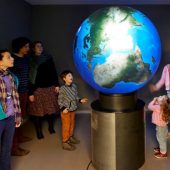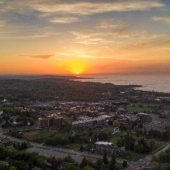
Abstract: This paper reports part of a larger study on the development of systems thinking skills in German 7th grade comprehensive school students regarding the climate. Research has shown a fragmented understanding of climate change among students that hardly accounts for the dynamic interrelations in the climate system and may pose a barrier in understanding adaptation and mitigation strategies (Shepardson et al., 2017, 2011, Calmbach 2016). While much is known the impact of short-term interventions on the general system understanding of students, what is lacking to date is 1) a specific intervention on climate system understanding and 2) insights into the process of developing system understanding in students. Helpful insights in this context come from Conceptual Development theories for they allow the development of systemic thinking to be viewed in terms of conceptual expansion or conceptual change. Starting from these desiderates, a teaching-learning sequence was developed based on the SYSDENE model of system competence (Frischknecht et al. 2008). In the sequence young learners systematically link experiences from formal science education with the experiences at three non-formal learning environments. A mixed-methods approach was used to explore the impact of this 3-month sequence on 19 7th grade students. A written pre-/post-test suggested a significant improvement in Climate System Reconstruction for the group (pre-test Median = 6.75 vs. post-test Median = 12.5, Wilcoxon Test: p = .003, r = .82). However, a qualitative analysis of classroom conversations, interviews and concept maps indicated that cognitive development toward a higher level of system thinking was neither continuous nor did every student reach it. Moreover, the SYSDENE model’s Competence Area “Describe System Model” proves critical. Being able to describe the main climate system factors is not sufficient, one also needs to be able to distinct weather from climate and grasp several scientific concepts related to the climate (e.g. greenhouse effect, water cycle, evaporation, reflection) in order to understand climate as a system.
Continue ReadingLink to the JSE Winter 2023 General Issue Table of Contents Editor’s Note: This contributed poem connects with the Councils of All Beings article by Karen Hindhede in this issue. In this circle wide in species and sparkling imaginings In this circle of story-sharing about sharing stories The call goes out rippling through Creatures, Places, […]
Continue ReadingAbstract: Actualization of the 17 sustainable development goals (SDGs) conceived by the United Nations in 2015 is a global challenge that may not be feasible in sub-Saharan Africa by the year 2030, except higher education play a committed role. There is need for higher education to embrace partnership and train people on the concepts of sustainability and sustainable development in the region. This paper presents a model center with curricular framework and partnership structure for the training. The Model Center for Sustainability Studies (MCSS) will enable partnerships with institutions in Africa and in advanced nations, thereby creating a global network for sustainability studies not found in sub-Saharan Africa. MCSS will train and certify public servants, government agencies, policymakers, entrepreneurs and personnel from organizations and students on aspects of the SDGs and sustainability science. It is important to add sustainability into environmental education and make environmental education a compulsory course in higher institutions and a secondary school certificate exam subject in sub-Saharan Africa. MCSS has 11 training modules that can be replicated anywhere in the world. Higher institutions in sub-Saharan Africa should follow this training perspective, to achieved SDGs, predicted 2040 against 2030.
Continue Reading
Abstract: Sustainability depends on biological diversity and the investment of individuals and communities in maintaining ecosystems. To engage the public in local biodiversity—specifically birds—we developed a program combining science and the arts. The science involved a group field experience, led by area birders guiding observations and providing information on the birds; the arts produced written reflections and visual representations of the birds and birdwatching. The integration of experiences, as manifested in field notes, artwork, and writing, reinforced understanding of, as well as interest in, birds and their natural habitats. In short, the data confirmed that participants gained a deeper appreciation for the natural world when seeing it in the contexts of both science and creative expression.
Continue Reading
Abstract: Sustainability is a core value of Gen Z and is increasingly a focus of campus strategic plans. Undergraduate survey data can inform campus programming by increasing our understanding of student sustainability behaviors, knowledge, attitudes, and how these relate to student participation in curricular and cocurricular activities. Repeated surveys can track change over time in general and among underserved demographic segments of the student population. Here we evaluate the first in a series of biennial sustainability surveys that will guide planning at a mid-sized midwestern university in the USA. Our survey, modeled after existing surveys, was distributed to undergraduate students at the University of Minnesota Duluth (348 respondents) and collected demographic information including: college affiliation, year in school, gender, race/ethnicity, and campus residence. Our study showed that student knowledge scores were comparable to similar surveys at other institutions (66%) and the average attitude score was very high (88%). However, scores related to sustainability action were strikingly lower, indicating a gap between students’ understanding and acceptance of sustainability concepts and their willingness to engage, which we refer to as value-action gaps. When significant differences were detected between demographic groups, students who self-identified as female were more likely to have a higher sustainability score than students who identified as male and students who lived off campus were more likely to have a higher score than students who lived on campus. Other demographic results were mixed or not significant. We also noted a trend for students to score lower on questions related to business or economic sustainability and, similarly, for business students to score lower on sustainability questions overall than students in other colleges. Based on these baseline results, we provide recommendations to improve sustainability education and address the value-action gaps identified in this survey.
Continue Reading